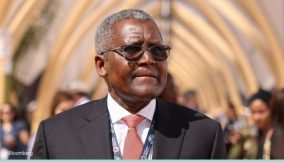Ikem Okuhu (2024), The Power of Nothing: Triumph and Thump of the People’s Voice in Enugu. Lagos: BRANDish Media.
What accounts for the different legitimate political outcomes between the incoming 45th president of the United States of America and Nigeria’s serially compromised political class? Trump is a moral leper with many negatives. Yet the American electorate endorsed him in the 5 November US presidential election. He did not need to switch votes, gerrymander the register, or engineer ballot swapping.
As you read this masterful treatise on political communication, questions such as these confront the reader. Ikem Okuhu’s The Power of Nothing tackles the hollowness of Nigerian politics by referencing one of the 36 states. His choice reeks of history, yet it is present as current affairs.
Enugu has a record of hosting angry political epistles. The tradition dates back to the young Zikists led by Mokwugo Okoye and Arthur Agwuncha Nwankwo’s How Jim Nwobodo Rules Anambra State. The Nwobodo government popularised Nwankwo’s book by charging him to court for defamation.
Peter Mbah and associates will likely avoid such rough tactics with Okuhu’s book. The ongoing ruckus with Dele Farotimi’s dissection of the Nigerian justice sector informs circumspection. However, should a hot head think otherwise, they will make The Power of Nothing another bestseller based on one man telling his truth to power.
The Power of Nothing recounts the trajectory of Chijioke Jonathan Edeoga, the Labour Party’s candidate for governor of Enugu State in the 2023 election. On the record, Edeoga lost to the incumbent governor, Peter Mbah. Okuhu and many on the losing side believe that a conspiracy of Nigerian electoral darkness delivered victory to the wrong person.
One of them is renowned writer Chijioke Amu-Nnadi. Others include former Information Minister and PDP chieftain Chief Nnia Nwodo, General Chris Eze (retired), Prof Barth Nnaji, Chief Emeka Mamah, Petr Odoh, and Emeka Abba.
Chijioke Amu-Nnadi penned the “Foretaste” titled “A People’s Will and the Force for Change” in the book wherein he asserted:
Make no mistake. We all knew that the Labour Party had become the ascendant party in Enugu State politics and had won the gubernatorial elections in March 2023. Everyone knows that, including those who confiscated the people’s mandate. Once at Ogbete Main Market, where I had purchased mangoes, a trader bemoaned the travesty of that declaration by the Independent National Electoral Commission, INEC. And she said something that still resonates. “We know who our Governor is”. Simple but resolute.
Spoken in pure Enugu dialect.
There are many villains and few heroes in this narrative. Former governor Ifeanyi Ugwuanyi is the foremost. Ikem Okuhu accuses Ugwuanyi of “building the sandcastle of succession red herring” to deceive Chijioke Edeoga that he would succeed him as governor while working against him. Edeoga was the preferred candidate of the Nsukka zone on whose support Ugwuanyi became governor. Okuhu worked in the Ugwuanyi administration for a while. The book captures his disdain for the ex-governor more concretely but only with a grudging regard for his political abilities.
Former Deputy Senate President Ike Ekweremadu gets a chapter for his interest in the Enugu gubernatorial race. Many factors ruled him out.
Okuhu offers a detailed look into political campaign strategy and manifestation when he tells the account of the Edeoga team in Chapter 7, “Inside the team which had nothing”. The Edeoga Brigade consisted of union members who originally owned the Labour Party, those who were locked by the management style and leadership selection processes of the PDP, those who stayed away from politics but were attracted by the fresh air the Labour Party appeared to have introduced, the lucky ones, and the turncoats who merely saw the party as a platform to realise selfish political ambitions.
They assembled a 15-person Communication and Strategy team, which crafted and implemented the political messaging centred on the thematic thrust of “I believe.” The messaging had an impactful and resonant copy. An example: I believe in God, the Father Almighty, Maker of heaven and earth; I believe in Jesus Christ, the only son of God. I believe in leadership driven by service. I believe in the ability of the Enugu people to transform our dear state through skills, talents, and oneness of spirit. -Chijioke Edeoga.”
This primary shot was based on the Catholic Church’s article of faith, which drew on the state’s numerical preponderance of Catholicism. It struck.
The Power of Nothing reads like a political thriller. It has elements like intrigue, assassination, attempted kidnap of the author, and framing for cybercrimes. These are characteristics of a thriller.
The reader gets a full briefing on the legal challenge Chijioke Edeoga mounted against the declaration of Peter Mbah as governor. Key planks were the credibility of his claims, integrity, and the failure of Nigerian institutions.
The book explores the concept of “nothingness” in Nigerian politics, arguing that the country often experiences a lack of substance and meaningful action in its political discourse and governance.
Themes explored in the book include lack of integrity of political leaders:
Empty promises: Nigerian politicians often make grand promises during campaigns but fail to deliver on them once in office.
Lack of accountability: Political leaders are not held accountable, allowing them to operate with impunity.
The harmful use of money in the political process.
Focus on rhetoric over action: Political discourse is often dominated by rhetoric and empty slogans, focusing little on concrete action and meaningful change.
The Power of Nothing is a valuable documentation of an era and its intrigues. Unfortunately, it is a for-the-records book with little capacity to change the situation.
Join BusinessDay whatsapp Channel, to stay up to date
Open In Whatsapp





